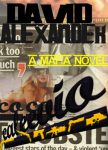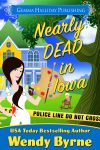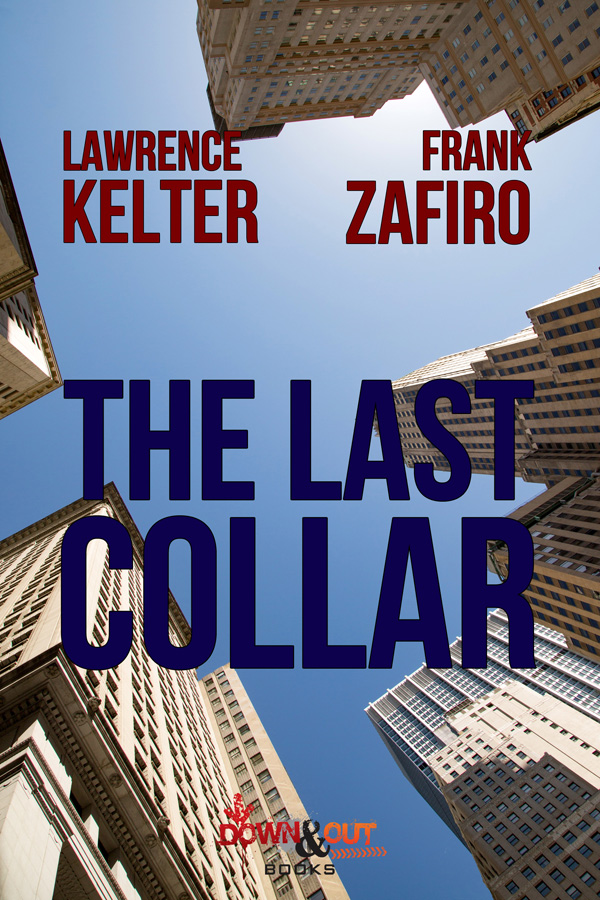

February 27 – March 5: “Do you review books in your genre?”
 Some authors refuse to blurb or review books in their genre, because as one put it, she did not want to be accused of borrowing ideas. This week we ask ITW Members David Alexander, Adrian Magson, Jon Land, A. J. Kerns, J. H. Bográn, Wendy Byrne and Frank Zafiro, do you review books in your genre?
Some authors refuse to blurb or review books in their genre, because as one put it, she did not want to be accused of borrowing ideas. This week we ask ITW Members David Alexander, Adrian Magson, Jon Land, A. J. Kerns, J. H. Bográn, Wendy Byrne and Frank Zafiro, do you review books in your genre?
~~~~~
 Jon Land is the award-winning, USA Today bestselling author of 41 novels, including eight titles in the critically acclaimed Caitlin Strong series, the most recent of which is Strong Cold Dead. Most recently, he’s teamed with ThrillerMaster Heather Graham to pen The Rising, the first in a series that features two high school seniors who are that stands between the world and total annihilation. The next Caitlin Strong book, Strong to the Bone, publishes next December, followed by Blood Moon, a sequel to The Rising, in January.
Jon Land is the award-winning, USA Today bestselling author of 41 novels, including eight titles in the critically acclaimed Caitlin Strong series, the most recent of which is Strong Cold Dead. Most recently, he’s teamed with ThrillerMaster Heather Graham to pen The Rising, the first in a series that features two high school seniors who are that stands between the world and total annihilation. The next Caitlin Strong book, Strong to the Bone, publishes next December, followed by Blood Moon, a sequel to The Rising, in January.
 David Alexander began writing early in life and began writing uncoaxed and spontaneously. His fledgling appearance in print dates to a sonnet published in a New York City daily newspaper when David was in elementary school in Brooklyn. Between then and today, he has written and published in virtually every literary category, including novels, novelettes, short fiction, poetry, essays and film scripts. He received his early education via the New York City public school system. He later attended Columbia University in New York City and Sorbonne University in Paris, France.
David Alexander began writing early in life and began writing uncoaxed and spontaneously. His fledgling appearance in print dates to a sonnet published in a New York City daily newspaper when David was in elementary school in Brooklyn. Between then and today, he has written and published in virtually every literary category, including novels, novelettes, short fiction, poetry, essays and film scripts. He received his early education via the New York City public school system. He later attended Columbia University in New York City and Sorbonne University in Paris, France.
 Wendy Byrne, a former social worker, is a USA TODAY Bestselling Author of suspense novels and cozy mysteries. Most days you can find her pounding away at her laptop spinning tales and inflicting mayhem on her hero and heroine until they beg for mercy. She lives in the suburbs of Chicago with her husband. Her latest mystery, Nearly Dead in Iowa was released in October, 2016.
Wendy Byrne, a former social worker, is a USA TODAY Bestselling Author of suspense novels and cozy mysteries. Most days you can find her pounding away at her laptop spinning tales and inflicting mayhem on her hero and heroine until they beg for mercy. She lives in the suburbs of Chicago with her husband. Her latest mystery, Nearly Dead in Iowa was released in October, 2016.
 Hailed by the Daily Mail as “a classic crime star in the making”, Adrian Magson is the author of 21 books, the latest of which is The Bid (Midnight Ink), published on January 8, 2017. This the second book in a new series featuring investigators Ruth Gonzales and Andy Vaslik, after The Locker—Jan 2016—”Magson takes the suburban thriller overseas and gives it a good twist. Readers ……will happily get lost in the nightmare presented here.” (Booklist Reviews)
Hailed by the Daily Mail as “a classic crime star in the making”, Adrian Magson is the author of 21 books, the latest of which is The Bid (Midnight Ink), published on January 8, 2017. This the second book in a new series featuring investigators Ruth Gonzales and Andy Vaslik, after The Locker—Jan 2016—”Magson takes the suburban thriller overseas and gives it a good twist. Readers ……will happily get lost in the nightmare presented here.” (Booklist Reviews)
 J. H. Bográn, born and raised in Honduras, is the son of a journalist. He ironically prefers to write fiction rather than fact. José’s genre of choice is thrillers, but he likes to throw in a twist of romance into the mix. His works include novels and short stories in both English and Spanish. His debut novel TREASURE HUNT, which The Celebrity Café hails as an intriguing novel that provides interesting insight of architecture and the life of a fictional thief, has also been selected as the Top Ten in Preditors & Editor’s Reader Poll. FIREFALL, his second novel, was released in 2013 by Rebel ePublishers. Coffee Time Romance calls it “a taut, compelling mystery with a complex, well-drawn main character.” He’s a member of the Short Fiction Writers Guild, Crime Writer’s Association, and the International Thriller Writers. He lives in Honduras with his family and one “Lucky” dog.
J. H. Bográn, born and raised in Honduras, is the son of a journalist. He ironically prefers to write fiction rather than fact. José’s genre of choice is thrillers, but he likes to throw in a twist of romance into the mix. His works include novels and short stories in both English and Spanish. His debut novel TREASURE HUNT, which The Celebrity Café hails as an intriguing novel that provides interesting insight of architecture and the life of a fictional thief, has also been selected as the Top Ten in Preditors & Editor’s Reader Poll. FIREFALL, his second novel, was released in 2013 by Rebel ePublishers. Coffee Time Romance calls it “a taut, compelling mystery with a complex, well-drawn main character.” He’s a member of the Short Fiction Writers Guild, Crime Writer’s Association, and the International Thriller Writers. He lives in Honduras with his family and one “Lucky” dog.
 Frank Zafiro is a retired police officer, and an author. He writes primarily crime fiction of the realistic, gritty variety, ranging from ensemble procedurals to private investigator mysteries. In addition to writing, he is a fan of good film and television, an avid hockey fan, and a tortured guitarist. And yes, a voracious reader. He lives in Redmond, Oregon with his wife, Kristi.
Frank Zafiro is a retired police officer, and an author. He writes primarily crime fiction of the realistic, gritty variety, ranging from ensemble procedurals to private investigator mysteries. In addition to writing, he is a fan of good film and television, an avid hockey fan, and a tortured guitarist. And yes, a voracious reader. He lives in Redmond, Oregon with his wife, Kristi.
 Arthur Kerns is a retired FBI supervisory special agent and past president of the Arizona chapter of the Association of Former Intelligence Officers (AFIO). His award-winning short fiction has appeared in numerous anthologies. He is a book reviewer for the Washington Independent Review of Books. Diversion Books, Inc. NY, NY published his espionage thriller, The Riviera Contract, and the sequel, The African Contract. The third in the series, The Yemen Contract, was released in June 2016.
Arthur Kerns is a retired FBI supervisory special agent and past president of the Arizona chapter of the Association of Former Intelligence Officers (AFIO). His award-winning short fiction has appeared in numerous anthologies. He is a book reviewer for the Washington Independent Review of Books. Diversion Books, Inc. NY, NY published his espionage thriller, The Riviera Contract, and the sequel, The African Contract. The third in the series, The Yemen Contract, was released in June 2016.
- LAST GIRL MISSING with K.L. Murphy - July 25, 2024
- CHILD OF DUST with Yigal Zur - July 25, 2024
- THE RAVENWOOD CONSPIRACY with Michael Siverling - July 19, 2024
